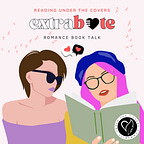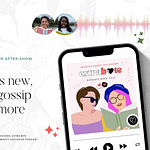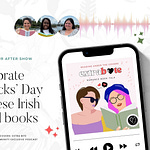The Reading Under the Covers: Extra Bite podcast is a bonus podcast and a paid members feature.
Younger, Age Gap Romances, & Power Imbalances: When It Works and When It’s Just Ick
Age-gap romances are one of those tropes that tend to divide readers. Some love them for the inherent tension and forbidden nature, while others find them uncomfortable or even problematic. And let me be clear upfront—I’m not here to yuck anyone’s yum. Both are valid points. Romance is deeply personal, and what works for one reader may be a hard pass for another. This is exactly why labels and trigger warnings in romance books are so important, allowing us to avoid things that might personally trigger us—but that’s a conversation for another day.
One of the ongoing debates in the romance community is whether books with power imbalances should be written in a way that appears to glorify or normalize toxic, abusive relationships. Because let’s be honest—age gaps and power dynamics can easily slide into dangerous territory, especially when the older partner holds all the control and the younger one is left without autonomy. And yet, I find myself drawn to these stories when they’re done right for me—when both characters retain their agency and the imbalance is acknowledged rather than exploited.
Maybe part of the reason I don’t immediately write off age-gap romances is because I grew up with an example of a healthy one. My parents had a 20-year age difference. They met when my mom was in her 30s and my dad was in his 50s. Both were successful business owners. Their relationship was built on mutual respect, admiration, and an appreciation for each other’s strengths. There was never a question of control or manipulation—it was a true partnership.
But I’ve also seen it not work. My first marriage was an age-gap relationship where the imbalance was not romantic or supportive—it was suffocating. That experience taught me that when the older partner views their age and experience as a means of control rather than as something to bring to an equal partnership, the dynamic quickly becomes toxic. So maybe that’s why I don’t dismiss this trope outright—I’ve seen both sides of it in real life. And that nuance shapes how I approach it in fiction.
Age Gap Romance vs. Daddy Kink
Alright, let’s clear something up first—when people hear age gap romance, a lot of them immediately jump to daddy kink. But those are two totally different flavors of romance, and while they sometimes overlap, they are definitely not the same thing. Let’s break it down.
Age gap romance is all about life experience differences. One person has been around the block a little longer, and that creates tension—sometimes internal, sometimes external, but it’s never just about power. It’s about navigating societal expectations, maybe some personal doubts, and ultimately finding love despite the gap. Take Heartless by Elsie Silver—Cade is a single dad, grumpy as hell, and thirteen years older than Willa, his nanny. What makes it work? Their relationship is built on mutual attraction, but also respect and deep emotional connection. Willa doesn’t feel like she’s being “taught” how to be an adult—she already is one. Their dynamic is about chemistry and care, not control.
Daddy kink, on the other hand, is less about the numbers and more about the dynamic. This is where the power element comes into play—authority, dominance, submission, and yeah, sometimes calling the love interest “Daddy.” But a daddy kink book doesn’t necessarily have to involve an age gap at all, although it often does! It’s about roles, not ages. A perfect example? Desperate Measures by Katee Robert. In this dark, steamy Aladdin retelling, Jafar literally owns Jasmine, and their relationship is built on control, trust, and a whole lot of tension. Unlike Heartless, which is about two adults with different life experiences coming together, Desperate Measures leans all the way into the power exchange, and that’s the whole appeal.
❗If you want some daddy kink recommendations, let me know!
So while age gap and daddy kink can definitely exist in the same book, they serve different purposes. You can totally love one and not the other, and vice versa.
But now that we’ve cleared that up, let’s talk about when power imbalances actually work in romance and when they make me want to throw a book across the room. Plus the ‘should vs want’ conflict in romance and a few book recommendations for age gap romances done right. I also sprinkle in some thoughts of why it didn’t work for me in Younger, which you can listen to my series recap and thoughts in today’s Extra Bite podcast episode.

















